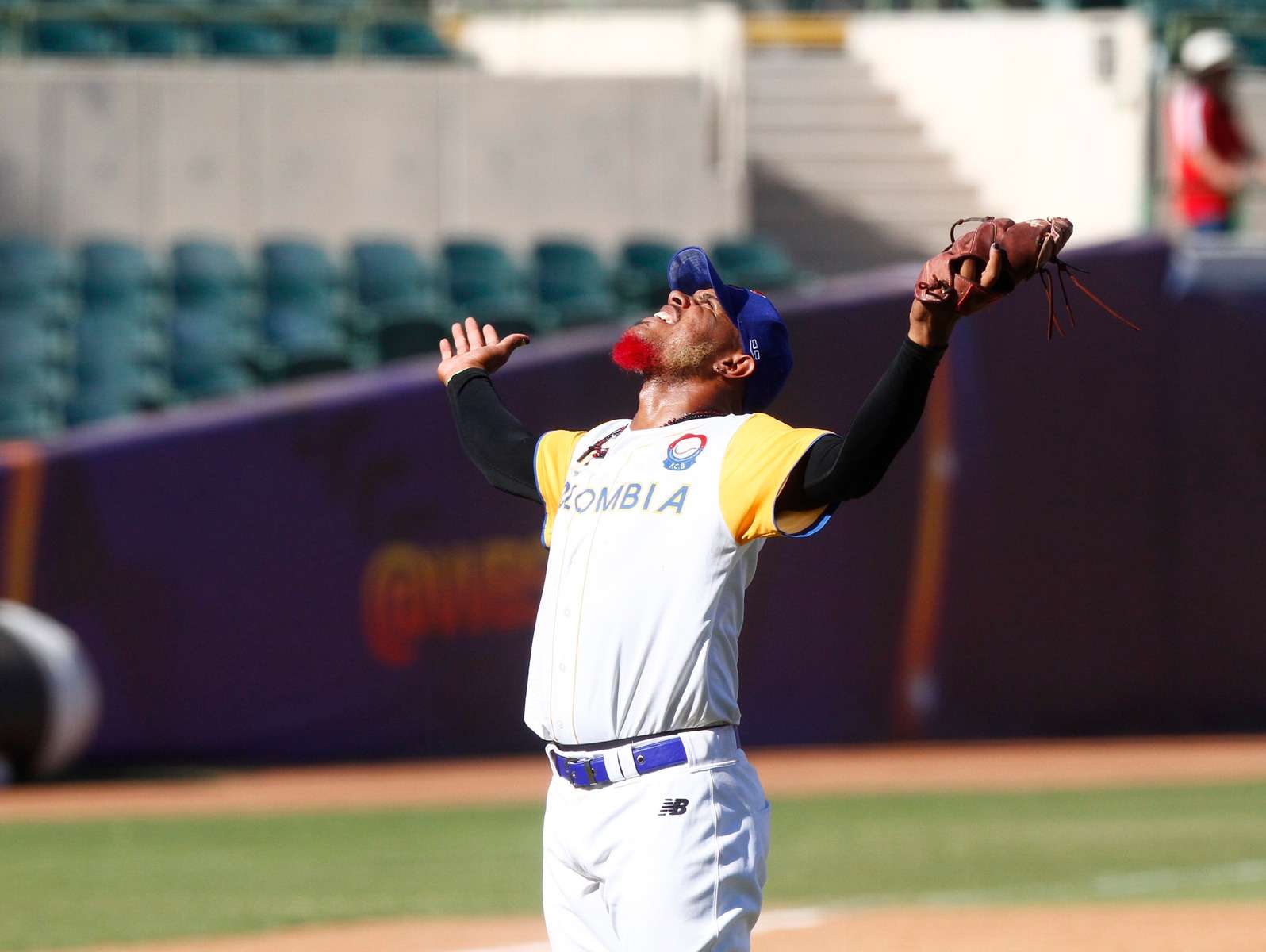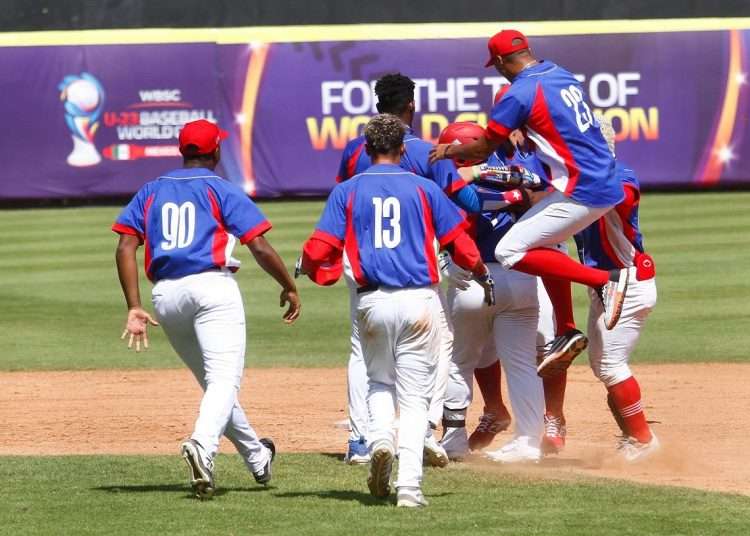Saturday, October 2, 2021. Shortly after three in the afternoon, Hermosillo, Mexico, time, outfielder Loidel Chapellí Jr., a member of an illustrious baseball family from Camagüey, hit a fly ball to the center and gave the last out of the match for the bronze medal in the U-23 World Baseball Cup.
That was the farewell to the Cuban team on the Mexican diamonds, where the hopes of returning to the island with a medal finally disappeared, while Colombia, a nation that until very recently could not stand up to us in baseball, achieved a historic bronze metal after beating us for the second time in less than a week.
Anyone would think that this was the end of the Cuban adventure in Mexico, but in reality there were chapters to write in the story.
Saturday, October 2, 2021. Between five and six in the afternoon, two or three hours after that fly that sealed Cuba’s performance in the World Cup, Loidel Chapellí Jr. consummated his “flight” with third baseman Yandy Yánez, also from Camagüey, increasing to 11 the number of casualties of the national squad.
Yes, you haven’t misread. Eleven Cuban players — they became 12 shortly before flying back to Cuba — decided not to return to the island and left the national team at different points along the way, some as soon as they landed in Mexico, others with hardly any games played, others in the final stretch. before vying for the bronze medal, and the last ones after giving their all on the field until out 21 (the World Cup matches were played in seven innings).
#U23WorldCup: #Cuba peleó a la altura de su estirpe, sobrepuesta a las limitaciones enfrentadas por los abandonos de quienes renunciaron al compromiso contraído como equipo. Un cuarto lugar que sabe a medalla para quienes se mantuvieron fieles. #Beisbol #BeisbolCubano pic.twitter.com/F4K5JQfm9w
— Federación Cubana de Beisbol y Softbol (@CubanaBeisbol) October 2, 2021
The figure, as you can imagine, constitutes a devastating, overwhelming and revealing record, if you will, a reflection of Cuban society, a sample of what a considerable percentage of the youth in the country thinks and pursues.
But let us remember, step by step, everything that happened with this team since its formation in mid-August until the final outcomes in the first days of October; two months of controversy, struggle and wounds that will take time to close.
The Names
Friday, August 13, 2021. A couple of months after the World Baseball and Softball Confederation announced the dates of the global U-23 category contest, the Cuban authorities formed the shortlist of 33 players, which aroused all kinds of comments and controversies among the fans.
Very talented boys stood out on the list, some already with some impact on the destinies of their teams in the National Series. Loidel Chapellí Jr., Geisel Cepeda, Guillermo García, Andrys Pérez, Iván Prieto, Brayan Chi, Frank Abel Álvarez, Naykel Cruz, Luis Danny Morales, Jonathan Carbó and Yeniel Zayas appeared as the most familiar faces for the fans.
However, the initial debate did not focus on the strengths and weaknesses of the group. In the first order, many questioned the appointment of Eriel Sánchez as mentor, but that was an unappealable move as it was precisely the Sancti Spíritus manager who achieved the World Cup qualification during the Pan American Championship held in February 2020.
In contrast, it made less sense to exclude pitchers Yosimar Cousín and Yunior Tur, two of the main Cuban pitching talents and important members of the Camagüey and Santiago de Cuba pitching corps, respectively, in the National Series.
We did not know, but the controversy surrounding these two absences was only beginning.
The interview
Sunday, September 12, 2021. Although a month had gone by since the preselection for the World Cup was announced, the fans were still focused on those who were absent. The names of Yosimar Cousín and Yunior Tur, were repeated over and over again after a month of preparation between Havana and Sancti Spíritus.
“It is inconceivable that they are not there by name and results,” Eriel said exactly on September 12 in an interview with Cubabebate, in which he gave somewhat contradictory statements.
On the one hand, referring to the exclusion of Cousín and Tur, he affirmed that “it’s not something that we decide directly,” but when asked about his autonomy in the making of the team, he specified that he did participate in the decisions: “I never imposed on anyone and I will never allow them to do that in my teams because in reality the one who is going to be criticized afterwards is me.”
In this zigzag, the once stellar receiver from Sancti Spíritus left a sentence that placed him in the eye of the hurricane: “Many parameters have to be measured to form national teams that represent our country in an international event. It’s not just looking at how much was batted, how much was pitched, or how much was fielded, there are other aspects such as discipline, patriotism.”
https://oncubanews.com/deportes/beisbol/el-alma-del-beisbol-cubano-en-juego/
This last word overshadowed any other criterion of Eriel on the formation of the squad, the strategies for the tournament and the possibilities of the team, even the fact that the team would go to Mexico blindly, without minimal knowledge of the rivals, went completely unnoticed.
“So far we have no information on our rivals. We have to strengthen what we have and go there with what we have. We’re going to play ball and it is not against machines or aliens, we are going to play with young people of the same category and with the same possibilities. The results will depend on what each one can do. It’s difficult because other countries take this into account, they play among themselves, they have more resources and we have our limitations, but I think that in the end that wouldn’t be a link that breaks and affects us in the result because in reality in all events where we participated before when I was a player, we also went without information.”
Cousín and Tur, the riposte
Tuesday, September 14, 2021. “Everyone knows that I should be there.” Yunior Tur was not interrupted when they interviewed him from Swing Completo to ask him about his absence from the U-23 national team. The Santiago closer, who had already questioned before how it was possible that he was not taken into account to integrate at least the preselection, also denounced that no one gave him explanations on the matter.
Tur’s statement was a preview of what would come later with Yosimar Cousín, who felt in the spotlight based on Eriel’s statements and his reference to patriotism as a selection criterion, which suggested that those absent had some type of ideological problem or bore disciplinary accusations
“I haven’t had discipline problems nor am I sanctioned for anything. I suspect that this is due to an investigation that they did a few months ago on players’ illegal exits and for which they interviewed me and I declared that I had nothing to do with that,” Cousín replied to his colleague Félix Anazco, from the Adelante newspaper.
“What bothers me is that nobody explains anything to me. They don’t speak clearly, because if it’s about this type of suspicion they must tell me, but not even that has happened,” the pitcher from Camagüey, who had been one of the mainstays of the team that obtained the World Cup qualification in February 2020, also Eriel as manager, lashed out.
The journey
Tuesday, September 21, 2021. A week after unveiling the roster of 24 players who would compete in the World Cup, the team left for Mexico, with the news of two last-minute changes. The utility from Granma Darlin Jiménez and the Cienfuegos outfielder Luis Enrique González were left out, replaced by fielder from Pinar del Río Reinaldo Lazaga and pitcher from Sancti Spíritus José Eduardo Santos.
A priori, it seemed like a simple direct trip to Mexico City and a subsequent connection to Ciudad Obregón, but a decision by the Cuban authorities made the journey more complex. Instead of covering the journey between the two cities by air, they did so by bus, despite the fact that the difference in the cost of services did not exceed $80 per person.
As a result, the team spent around 23 hours on the highway to cover more than 1,600 kilometers of route, crossing the cities of Toluca, Morelia and Guadalajara and then skirting the Pacific coast until reaching the southern portion of the state of Sonora.
What could have been a two or three-hour trip by plane turned into an odyssey. Almost a full day on the road produced significant physical wear and tear, from which the boys were slow to recover. To make matters worse, already on that trip the team traveled with one member less.
Between “getaways” and games
Tuesday September 21, 2021. We continue on the same day, but in another place. When the Cuban players left the Benito Juárez airport in Mexico City to get on the bus to Obregón, they realized that a man was missing from the group. No, it was not José Eduardo Santos, who would join later after being included in the payroll at the last minute, and no, obviously it was not Loidel Chapellí Jr., who was already waiting for them at the venue.
The “disappeared” player was Luis Danny Morales, one of the team’s most talented pitchers and, perhaps, the greatest promise of the Cuban pitchers who still remain on the island. With a powerful fastball and an innate ability to picture hitters on the plate, the Sancti Spíritus pitcher had shown credentials in national tournaments of different categories, drawing attention after striking out 135 opponents in 82 innings of the last junior championship.
As fast as his pitching and applying a formula similar to that used by César Prieto in the Florida Pre-Olympic just a few months ago, Morales didn’t even wait to leave the airport to leave the entourage.
https://oncubanews.com/deportes/beisbol/el-agujero-que-abre-cesar-prieto-en-la-seleccion-cubana-de-beisbol/
The news spread like wildfire and many ventured to say that this was a sung play, since the pitcher had already been caught in an attempt to leave the country illegally in September 2020, and for it was sanctioned for three months with no options to compete at home. That “punishment,” however, came to almost nothing and Morales was able to debut in the 60th National Series with Los Gallos.
Now, in Mexico, his departure marked the start of a frenzied career, which was joined by 11 other players to complete the chapter with the most casualties for a Cuban national team in any sport.
After Morales and already in Obregón, the next to take flight was the Santiago de Cuba pitcher Ubert Luis Mejías, another promising arm that will seek to establish himself in professional baseball. On the night of September 23, just when the team’s debut against the Dominican Republic was due to be consummated — frustrated because of the rain — the indomitable pitcher vanished.
Less than 24 hours later, the receiver from Sancti Spíritus Loidel Rodríguez also left the Cuban team, which had lost three men before throwing the first ball. And so, managing the logical downturn that these events represent, the team opened against Mexico and lost, a very bad omen.
However, on the following day they recovered and achieved a crucial victory against Chinese Taipei, which served as an impetus for the easier matches of the key against Germany and the Czech Republic, which also ended with victories.
The problem is that, along with the victories, the casualties increased. At dawn on September 26, Reinaldo Lazaga and Dariel Fernández, from Pinar del Rio, and a third from Sancti Spíritus, Dismany Palacios, left the team’s hotel.
Left with 18 players on the roster, there was a dense air in the Cuban ranks and other episodes of tension were still missing. Specifically, on the morning of September 28, just before the clash against the Dominican Republic, which defined the fate of the team in the face of the Super Round, the Pinar del Rio southpaw Yeniel Zayas also left the group, leaving only seven pitchers available in the staff.
Already at that point, Cuba was adrift. The management was a bundle of nerves and began to use pitching as in the 1940 championships. On two consecutive days, Eriel Sánchez first squeezed José Eduardo Santos and then Naykel Cruz beyond 100 pitches unnecessarily, with open games. and available and underutilized relievers in the bullpen.
We will never be able to prove it and perhaps the pitchers themselves will never admit it, but neither Santos nor Naykel could contribute anything more to the Cuban cause in the Super Round after their enormous wear in qualifying matches.
With the watering-down pitching, the offense contributed little, once again sunk in the eternal potholes of producing runs that national teams go through. With no extra-base hits, no home runs and very low on-base averages, the team only had to pull off heroics, but in modern sport that is not enough to beat moderately solid teams like Venezuela and Colombia.
The two South American teams dealt heavy blows to the Cuban squad, whose chances of advancing to the final vanished in the blink of an eye. What remained then was the opportunity to discuss the bronze if they beat Panama when October dawned, and they didn’t allow that chance to escape.
With a push, going back twice against adverse markers, Cuba left the field to the Panamanians in extra innings. A good relief from Brayan Chi, a decisive hit by Yuddiel González and three crucial bats by Rodoleisis Moreno, the weakest hitter in the squad, were the keys to success, which, combined with other results and tiebreakers, placed the Cubans in the fight for bronze.
The rival to be part of the podium were again the Colombians, a nation that until a very short time could not stand up to Cuba in baseball. But times have changed and, at least in this category, the Colombians gave the impression of being the Cuban team’s cruelest executioner.
For that match, the team led by Eriel Sánchez arrived with just enough, without change players and six available pitchers. The previous afternoon, when they were still celebrating the victory against Panama, the Granma infielder Miguel Antonio González left the hotel and never returned, and a few hours later the Havana pitcher Brayan Chi followed suit. Nine “flights” in nine days.

With this cross, completely limited in terms of variants and strategies in the field, defeating Colombia was a utopia. The boys fought and it seemed they had the game in sight, but in reality the South Americans were much further away than the two or three runs of difference shown on the scoreboard.
The last out fell with that fly to the center of Loidel Chapellí Jr., which closed the Caribbean performance in a chaotic, turbulent, tense and not very pleasant World Cup. As we have already said, Chapellí himself and Yandy Yánez increased the list of casualties to 11, a figure that represents a very hard blow to the declining morale of Cuban baseball.
With 13 players, the managing body, the federation, a journalist and a camouflaged agent, the delegation returned to Mexico City to board the flight home anonymously at dawn on October 4, 2021. The movie was almost over. But there was one more chapter of anxiety left: at the Benito Juárez airport, where Luis Danny Morales himself had “fled” 13 days before, another player from Sancti Spíritus named Geisel Cepeda also stepped out of the car.
There were 24 and 12 returned. Unheard of.










